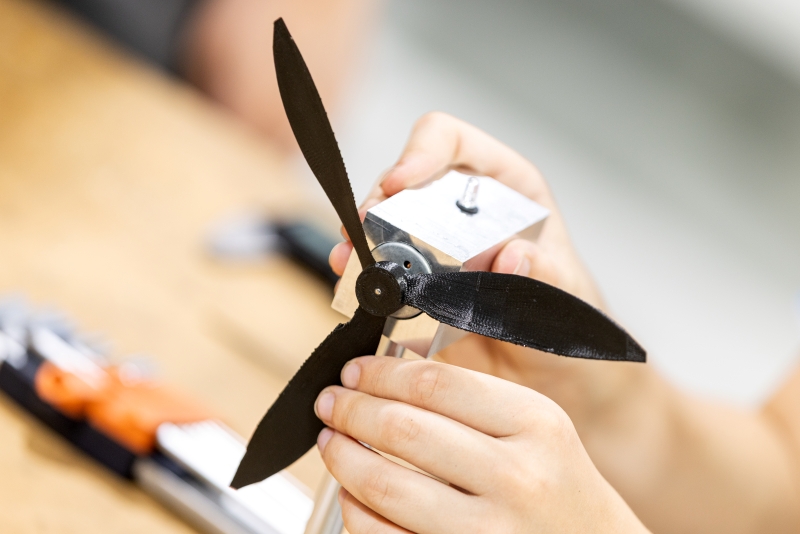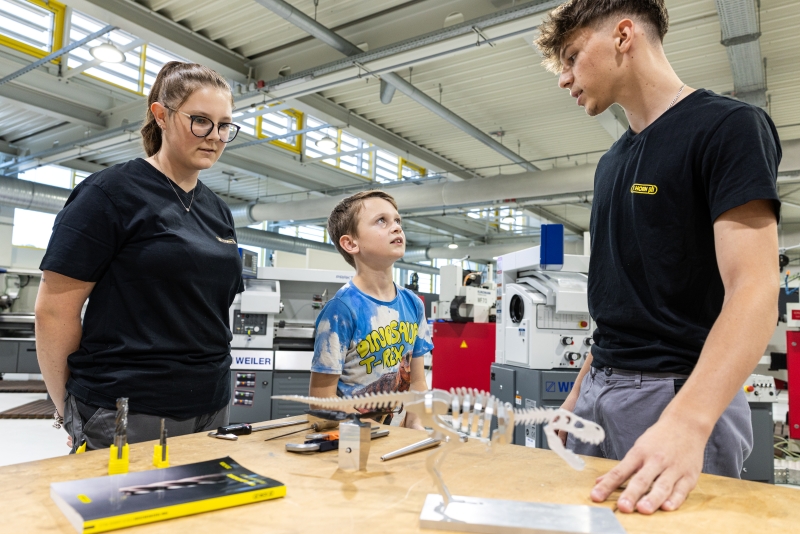HORN cooperates with Hector Children’s Academy
Since the 2012/13 school year, the Hector Children's Academy in Tübingen has been offering around 50 courses a year for particularly gifted children. These take place outside regular lessons at primary schools in Tübingen and, in some cases, in cooperation with companies. To ensure that these children continue to receive support beyond primary school, the Hector Children's Academy in Tübingen cooperates with a number of training centres in Tübingen, including the one run by Paul Horn GmbH.
This cooperation helps the children to expand and deepen their knowledge through practical learning and direct application under the guidance of experts.
This year, primary school pupils from various schools in Tübingen once again had the opportunity to take part in the course "From raw material to finished aluminium dinosaur". Over four Thursdays, the participating children designed and built a Tyrannosaurus Rex out of aluminium.
In this course, the pupils were introduced to various areas of learning, ranging from design and materials science to machining, component inspection and final assembly. The individual aluminium components were manufactured on a DMU 50 CNC milling machine and the learning units took place in the training centre of Paul Horn GmbH.
Promoting young talent is one of the pillars of Paul Horn GmbH's strategy for long-term success. In addition to vocational training and dual study programmes, the Hector Children's Academy is another important component of this strategy.
The Hector Children's Academies are the only nationwide organisation that offers particularly gifted and highly talented primary school children a specially developed support programme in addition to their regular school lessons, which goes far beyond the standard curriculum. Around 23,000 primary school children take part in the courses offered at 69 locations every year.
The courses offered by the Hector Children's Academies focus on STEM subjects (science, technology, engineering and mathematics).
Talent and giftedness develop from a close interaction between aptitude and environment. A large proportion (50 to 70 percent) of the variance in intelligence in the population is determined by genetic factors. This means that non-innate influences such as encouragement can also contribute positively to the development and emergence of giftedness. In order for children with special talents and potential to achieve exceptional performance, it is also necessary – as in music or sport – to train intellectual giftedness with an appropriate degree of perseverance and diligence. The earlier a child's giftedness is recognised, the earlier training and support can begin.
Early learning opportunities are important for the development of special talents. However, individual support needs are not easy to implement, especially in everyday primary school life. Expanding the range of learning opportunities within the framework of enrichment is therefore an effective support approach that the Hector Children's Academy programme has adopted. Enrichment means that particularly gifted and highly gifted pupils receive additional learning opportunities tailored to their needs in addition to their school lessons. The development of particularly high abilities is specific to each area and depends on personal characteristics, such as the motivation and interests of the children.
The courses are designed to promote the children's interests and potential and to create intellectual and social challenges. The children should be able to deepen their subject-specific knowledge, develop new skills and unleash their creativity. The programme is constantly being refined based on findings from scientific studies, which also prove its effectiveness. The participating children benefit from this close exchange between science and practice through a range of courses that are optimally tailored to their needs.

